Yeovil Trades & Traders
thomas denner
Ironmonger of High Street
Thomas Denner was born in Honiton, Devon in 1839 but by 1861, he was living above the ironmongery shop run by Joseph Hannam in the Borough. The 22-year old Denner was listed as a shopman assistant. By 1871 Josiah Hannam had retired and his shop was taken over by confectioner William Maynard.
Thomas Denner, in the meantime, had gone into partnership with Henry Stiby and in May 1869. It is thought that Denner and Stiby established their 'Furnishing and General Ironmongers' business around the time that Hannam retired leaving Thomas Denner unemployed. The shop of Denner and Stiby was in the old shop previously run by James Corfield on the site of (and possibly in the actual building of) the old George Inn in High Street, next to the town hall (see Gallery). The first floor of their shop adjacent to the town hall in which Thomas lived was over the entrance to George Court, an alleyway connecting High Street with South Street before the building of King George Street.
By the time of the 1871 census 31-year old Thomas Denner was married and was recorded as living over the shop premises in High Street with his 38-year old Dover-born wife Emma, their two children; Elizabeth aged five and two-year old Ernest, and a domestic servant. On the census it stated Thomas' occupation as ironmonger and that the business employed two assistants and two boys.
A nice story appeared in the Western Gazette in 1961 "Mr Denner was a very courteous man, but his patience was once sorely tried by a lady who called in to select a wedding present. She was difficult to please, but at long last decided that a coal vase near the doorway, price 25s, might be acceptable and for which she offered Mr Denner 20s. With a courtly bow Mr Denner opened the door to the street remarking 'Madam, we are not gypsies'."
By 1881 Thomas had moved his family and the accommodation over the shop was empty. From this time onwards the Denners lived at the corner of Summerlands on Preston Road.
|
In the 1891 edition of 'Where to Buy' Joseph Brutton's business was given the following description -
Messrs.
Denner
and
Stiby,
Mr Vickery in his sketch of the ancient town of Yeovil [1856] thus refers in his quaint language to the quiet ways of the tradespeople of a past generation - "Our plodding canny forefathers appear to have studied economy, and looked for sure and steady profits, caring little for external show, and much less for internal accommodation. The articles they dealt in were, according to their ideas, too well known to need a close inspection, and themselves too honest, and, we may add, too independent, to render it very safe for the purchasers to bandy the language of abatement," &c. A wonderful improvement, however, has taken place in modern times; and, not only are the exteriors of the shops handsome and attractive, but the internal accommodation is abundant, and the intending purchasers have every facility for closely inspecting the goods before buying, while the better class of tradesmen courteously assist their customers and in every way endeavour to satisfy them with their bargains. It does not follow that this has abolished all the old businesses. On the contrary, those that were firmly established and soundly organised have gained increased force, and are still among the progressive leading trades of the modern- town. Such is that under the proprietorship of Messrs. Denner and Stiby, furnishing and general ironmongers, of High Street, which dates back so far that it is difficult to trace its original commencement. The trade has been in the hands of the present firm for the past twenty years, and during that period has kept well ahead of all competitors. The premises are centrally situated near the Town Hall. The show rooms and work shops are fitted up with every modern appliance. The stock of goods includes all kinds of house furnishing, ironmongery, grates, stoves, bedsteads, toilet ware, &c, besides hot water appliances, garden rollers, lawn mowers, tools, chaff cutters, root pulpers, hay knives, scythes, hooks, and every description of agricultural and dairy implements. A staff of experienced workmen are employed in making and repairing all kinds of tin and metal work, dairy utensils, machinery, &c. The members of the firm exercise a personal supervision over all, so that customers can rely on having their orders satisfactorily executed. The manufactured goods are obtained only from the leading makers.
Messrs.
Denner
and
Stiby
have
gained
the
confidence
and
secured
the
continued
support
of all
classes
in the
town and
neighbouring
district
of
Somerset
and
Devon. |
Both Thomas and his partner Henry Stiby retired in 1894 and their shop premises were sold to James Bazeley Petter as a branch for his main business a few doors along towards Wine Street. Subsequently it became Llewellyn's greengrocery and florist shop. It was finally bought by the council and demolished around 1927 for the construction of King George Street and the new municipal offices.
maps
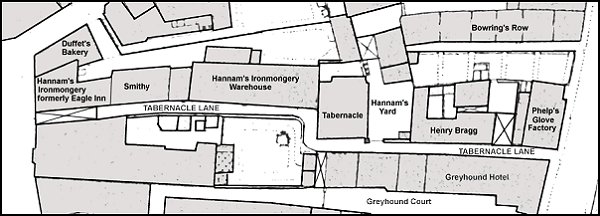
A map based on the 1886 Ordnance Survey showing Tabernacle Lane running between the Borough at left and South Street at right. Josiah Hannam's ironmongery is seen at left and his large warehouse in Tabernacle Lane left of centre. Thomas Denner was living above the ironmonger's shop in 1861.
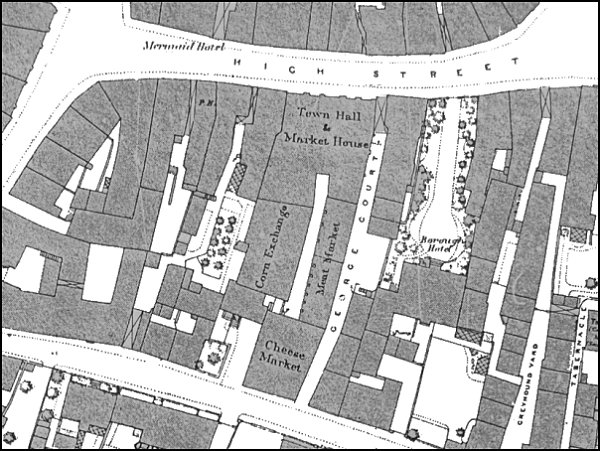
The 1886 Ordnance Survey showing the Town Hall & Market House, the Corn Exchange, Meat Market and the Cheese Market. George Court runs between High Street at the top of the map and South Street at the bottom and Denner and Stiby's ironmongery was the building in High Street immediately right of George Court.
gallery

Denner & Stiby's advertisement of 14 May 1869 in the Western Gazette informing the 'Gentry, Clergy, and Public generally' of their new enterprise.
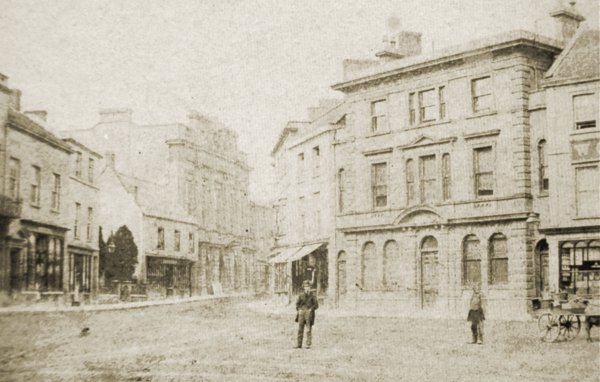
A very early photograph, dating to about 1860, shows High Street as seen from the Borough. Notice that at this stage the Town Hall lacks a clock tower which was not to be erected until 1864 but taken down in 1887 as unsafe. Henry Stiby and Thomas Denner were to purchase the shop next to it for their ironmongery business within the next decade.
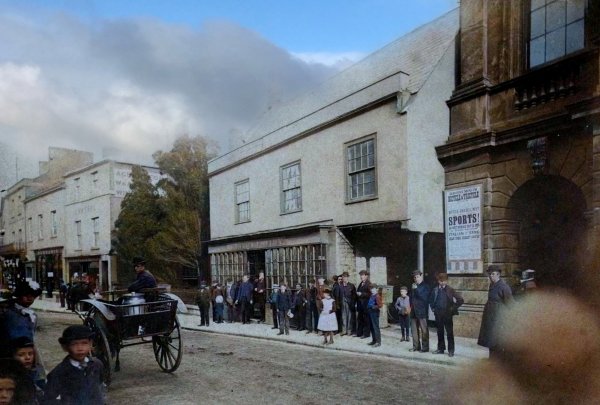
From the Stiby
Collection
(colourised),
Courtesy of South Somerset Heritage Collection
Denner & Stiby's shop photographed in 1883, probably by Henry Stiby who was a keen amateur photographer and left a good record of photographs of Yeovil. Note under the right of the three first floor windows, where Thomas and his family lived, is the entrance to the less-than-savoury George Court.
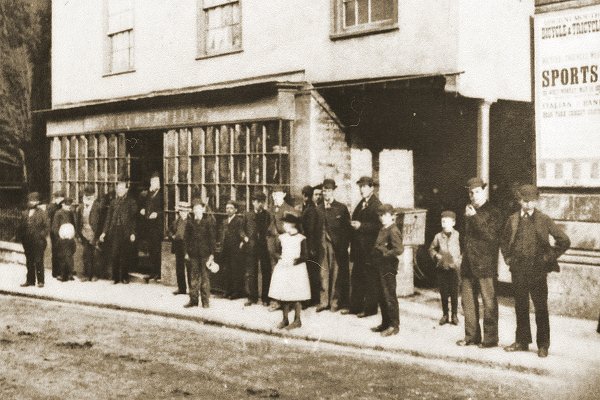
An enlarged detail of the previous photograph showing the shopfront in greater detail - the name signage 'Denner and Stiby' is just discernible over the door.
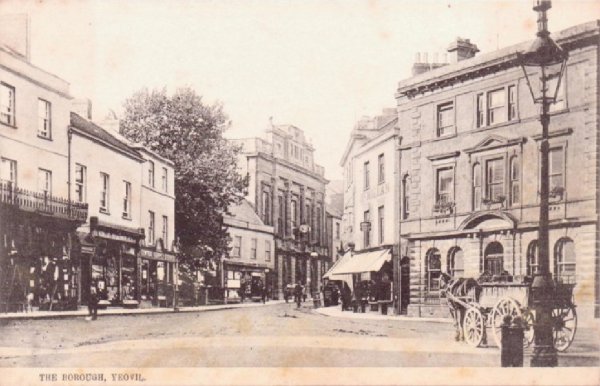
This postcard of the Borough dates to about 1905 and shows the former Denner & Stiby premises at centre, between the tree and the town hall. By this time both Henry Stiby and Thomas Denner had retired from the business.